Previously on Drokk!: The unlikely combination of Judge Dredd and the Alien franchise produced a particularly strong epic, while relative newcomer Gordon Rennie staked a claim as the best non-John Wagner writer the character has seen since the earliest days of Alan Grant. Things are looking up!
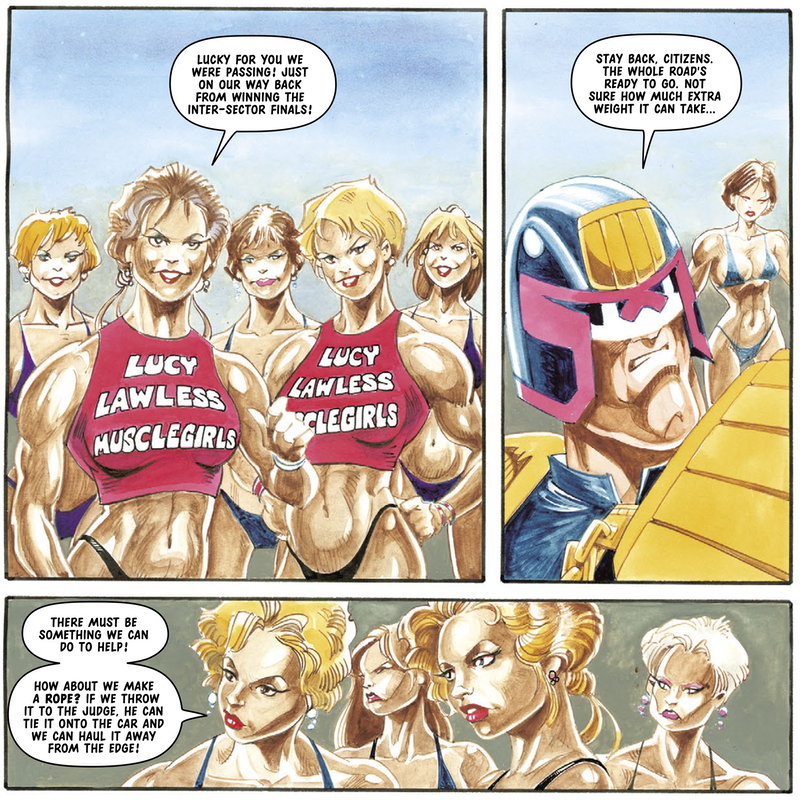
0:00:00-0:06:51: In addition to Jeff’s unexpected a cappella version of the theme music, we introduce ourselves and the book we’re talking about this episode: Judge Dredd: The Complete Case Files Vol. 37, which collects material from 2003. That’s right; we’re within two decades of publication now, shockingly. I start complaining about the volume early, setting the tone for what’s to follow.
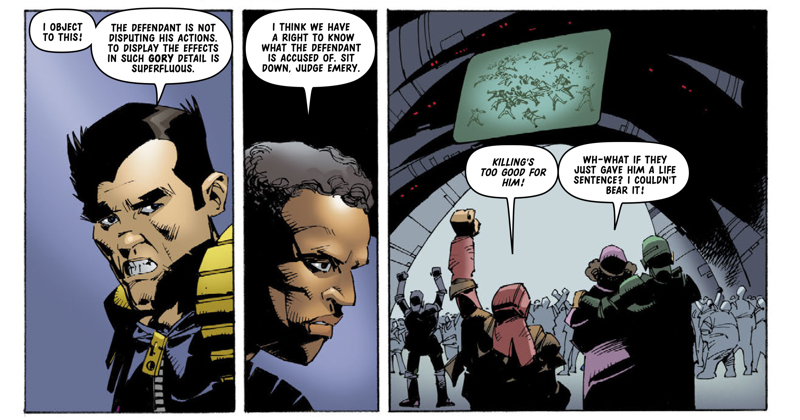
0:06:52-0:25:01: We slide quickly into talking about “The Trial of Orlok,” a two-part story that manages to simultaneously underwhelm and overwhelm the reader in wrapping up the long-running plot about the Sov-City super spy and his attempt to get revenge on Dredd for the events of the Apocalypse War. Why does this story fail to offer anything new, and why are there so many panels and speech balloons per page? Is Wagner trying to echo his earlier trial of Dredd storyline with this one? Is Cam Kennedy the wrong artist for this story, and relatedly, am I the sumo wrestler of Cam Kennedy fans? (It’ll make sense when you listen, I promise. Well, more sense.) And, most importantly, why does this storyline feel like such a waste of everyone’s time, and Orlok’s potential?
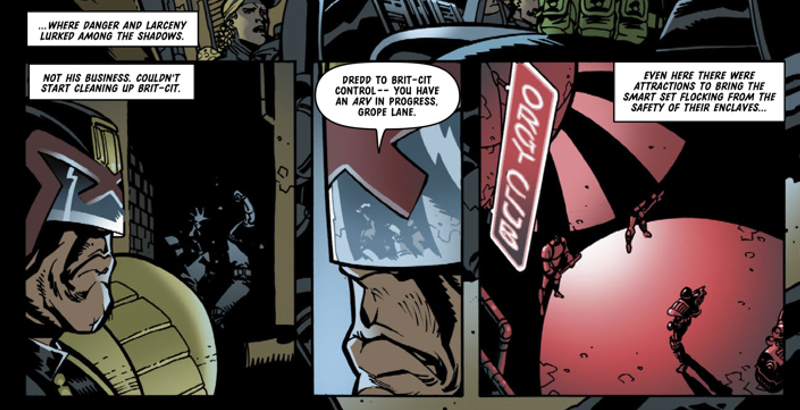
0:25:02-0:51:23: I was similarly disappointed with “The Satanist,” but in discussing it with Jeff, I admit that I find myself pretty much turned around to a large degree. Its a Hammer Horror pastiche to some degree, and Jeff’s love of that and explanation as to why some of the shortcomings are actually, if not intentional, then at least in keeping with the source material genuinely helped me enjoy the story more. Also discussed: Dredd’s complicated relationship with his niece, and his similarly complicated relationship with his family in general; Dredd as comics’ greatest asexual, and what that means for his placement in a horror leaning heavily into noir tropes; Jeff’s description of Dredd’s uniform as “old man PJs”; and much, much more!
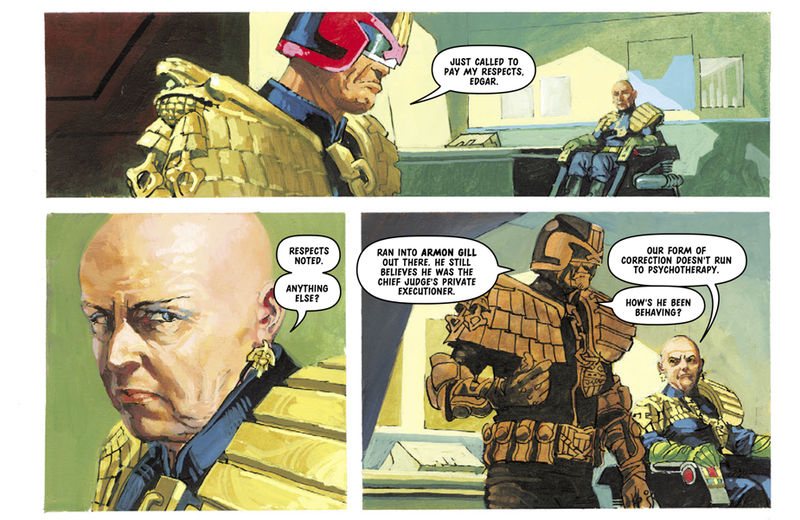
0:51:24-1:14:09: “There’s no sizzle on this steak!” is what Jeff has to say about “Revenge of the Chief Judge’s Man,” a storyline that he actually likes quite a bit — in no small part because of John Burns’ art, which we surprisingly don’t talk about much at all. (It’s really good.) Instead, we focus on Jeff’s love of what he himself calls “First Blood shit,” as well as an unexpected LMD twist with a great punchline at the end, the sudden switch into unstoppable superpowers mode for the eponymous Chief Judge’s Man, and the ways in which none of the fine ingredients for this particular story end up coming together entirely successfully. Come for the analysis, stay for Jeff’s great booing of me when he doesn’t agree with what I’m saying. (Honestly, I think the booing is really funny.) Actually, no; stay for Jeff talking about John Wagner’s narration and how successful it is, because he’s entirely right on that front.
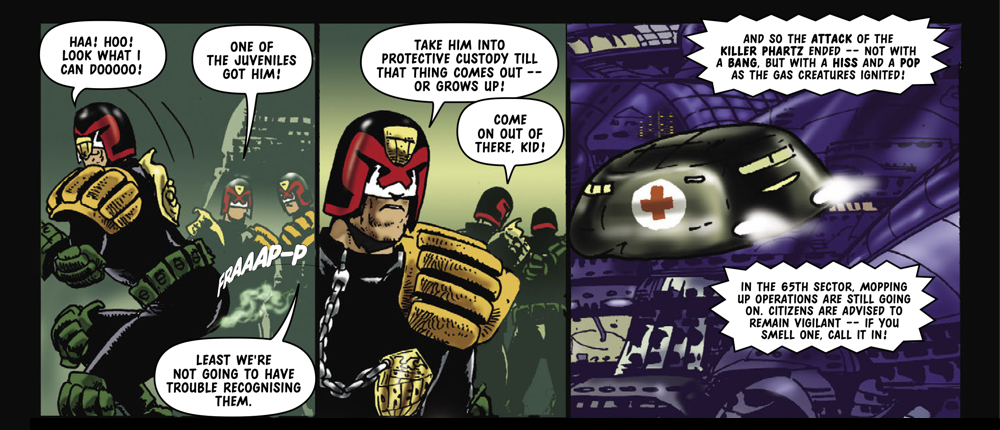
1:14:10-1:36:15: Just an episode after we sang Gordon Rennie’s praises for being very Wagner-esque, we return to find his work in this volume lacking — but is that because of the page length on the Dredd strips in this particular era, and what that does to the comedy material? We also talk about the Megazine material from this volume in general, which includes a story actually called “Phartz,” one of shockingly two stories in this book about deadly forces that have uses for their victims’ anuses. (Unsurprisingly, “Inside Job,” the other of those two, also comes under discussion.) Plus! I don’t like Robbie Morrison’s sole contribution to the volume, “Hard Days Night,” and we briefly talk about how important I find artwork to Dredd shorts, and Dredd as a strip in general, all of which leads into…
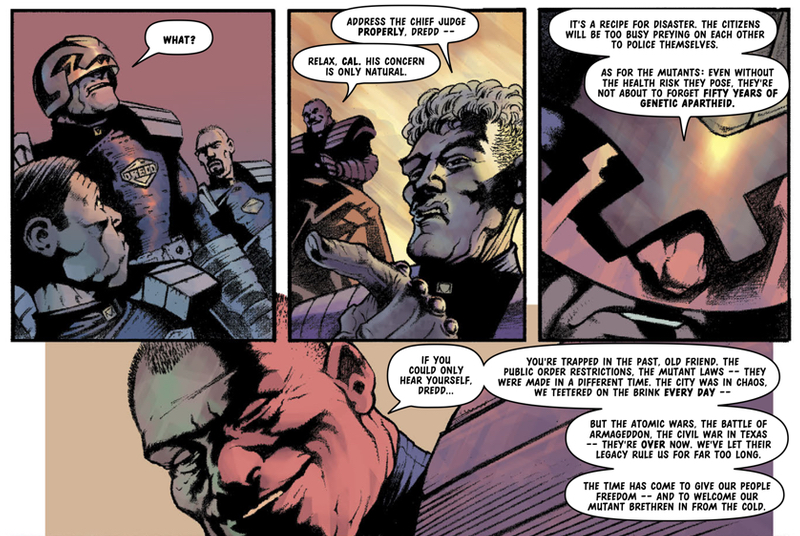
1:36:16-1:56:04: Garth Ennis had one last Dredd story in him after all, and it’s… not very good..? It does, however, feature amazing art from John Higgins, and we spend some time singing his praises, deservedly. Otherwise, we talk about the strange continuity mistake at the center of this story — something that gets Jeff referring to it as an Elseworlds — and the metaphors and real world politics that might lie underneath what is otherwise a pretty bigoted and gross story. (Really, commenters, Jeff and I would both genuinely love to know if you’re seeing what we are with this one.)
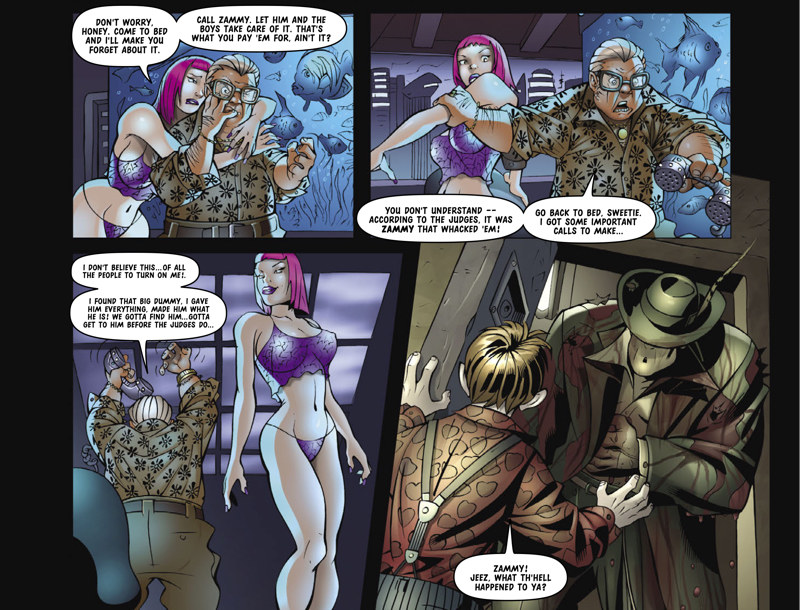
1:56:05-end: We wrap things up by asking Drokk or Dross, and at least one of us can’t make up our minds. (It’s me; Jeff thinks it’s Drokk.) Jeff’s favorite stories are “The Satanist” or “Monkey on my Back,” despite the bigotry at its core because that John Higgins art is so good; mine is, after I change my mind at the last minute, “Holding On,” a slight but amusing comedy short. “Bato Loco” is Jeff’s least favorite story, but I opt for “See Zammy Run,” and I make Jeff sad by teasing the return of Siku in the next volume. (I couldn’t help myself.) As always, we mention the Twitter and the Patreon, and as always, I’m very grateful for those who read and listened along with us this month.


Am I the only one getting a repeat of the previous Drokk in the podcast feed?
Ugh, I’m so sorry—the link needs to be updated in two spots and I only did it in one.
I’ve since updated—you may need to refresh the feed (somehow?) but it’ll take you to right ep. now. Let us know if not, and sorry again!
-Jeff
I don’t know what Jeff was referring to about the negotiations in 2003(ad). The only thing coming to mind was the on-going talks about the IRA decommissioning weapons vs the wholesale demilitarisation of Ireland. So indeed, fire up the Voord Signal! However, ‘siege mentality’ is commonly used descriptor of we northern ireland protestants and it’s not always unfair. There must have been some reason I kept reading all those David Gemmell novels, after all. The Ennis story is horribly pro-oppression. It is a shame that John Higgins great artwork is put to this use. Higgins has always been really invested in depicting the scale of Mega-City One and this was his most effective portrayal yet, not just next level, but several levels higher than his last outing. It’s a pity we did not get a more thoughtful story about the wall. If I remember correctly it was built to keep the citizens in, as part of Cal’s genocidal scheme. Isn’t there a juicy, cynical tale about the Justice Department deciding to keep it and then trying to sell it to a citizenry, whose friends and relatives died building it during the Judges greatest failure (at that point).
The Trial of Orlok does seem like a criminal misuse of Cam Kennedy’s time. See Zammy Run I disliked more than either of you, since it seemed to go along with notions that women organising murder is worse than men doing it. This has been around at least since the classical Greek and Roman cultures.
Bato Loco, as well as being racist, is also something of a Damon Runyon riff. Mostly just made me feel like re-reading a story with Harry the Horse or Nicely Nicely in it.
It’s been 30 years since “Last Gleaming” and y’all are surprised Ennis loves Big Brother?
I have just learned that Alan Grant has died. A sad day.
(Replying to Shadavid)
Yes, the thing I would think about in 2003 in Northern Ireland was the election, and the big gains for both the DUP and Sinn Féin. Which was obviously a step towards the current difficult situation.
But I don’t think that Ennis would necessarily be responding to any specific event with this sort of thing. Insofar as Northern Ireland is relevant, it would be less a united Ireland than the issue of compromise with Northern Irish Catholics that this would evoke for me — Ennis makes Dredd the mouthpiece for a grim and unpleasant view that it doesn’t matter if you know that you have oppressed someone, and that compromise and redress are still naive and disastrous no matter how much you are in the wrong, because the people that you have oppressed will inevitably take their revenge — you have no choice but to keep on doing the oppressive things that you are doing. That applies to Northern Ireland. (but it also applies to other situations where one group has committed wrongs upon another).
I’m not Garth Ennis’s therapist, but I wouldn’t say that he was necessarily conscious of any of that when writing this story. When Ennis has written soapbox-y things elsewhere, his conscious politics seem a lot more palatable. I think it’s easy, when telling stories, to fall into ingrained cultural patterns that can be quite different from one’s conscious views. Insofar as anything seems to me to be the key to Ennis’s Dredd work, it’s his love of the character as a child — he doesn’t come across as interested in excavating problematic aspects of just why he responded so deeply to Judge Dredd, and in celebrating Dredd, he ends up celebrating his own response.
What I do think, though, is that Ennis gives little sign of consciously trying to *avoid* sending messages that would tend to inflame sectarianism and justify sectarian violence.
The worst offender here is The Chieftain. Supporting Rangers doesn’t *have* to be about prejudice against Catholics, of course (he said quickly, because this obviously might be relevant to Mr. McMillan, and his friends and family). But to say that displays of support for Rangers FC in Northern Ireland aren’t often… (bursts out laughing, can’t complete the sentence). if Ennis were concerned about the message he was sending to the young Northern Irish Protestant boy who’s the same age as Ennis when he fell in love with Judge Dredd and who might read that story through a sectarian lens, he would not have written that story at all. The same applies, in a less extreme way, to a lot of the rest of his writing.
However, there is actually something good about that story that isn’t the art, that represents improvement for me in Ennis’s Dredd. This is part of it being set in the past. That may have been a convenience, because it might seem hard to do this story with Chief Judge Hershey. But Ennis does exploit it to give us a Dredd who’s clearly and interestingly a younger Dredd who’s not the colossal iconic figure that he’s become in the “present day” (including in Ennis’s own writing). This is a Dredd we haven’t seen in a while, one whom no-one, including himself, knows is the main character of the strip.
This is most visible in his interactions with Chambers — she likes and respects Dredd, but they’re equals. The whole issue of whether he’s her friend arises because this is a relationship in which Dredd credibly could have a real friend. I find this to be by far the most interesting version of Dredd that Ennis has ever written.
Even if Chambers might as well have been called “Judge She Will Be Dead By The End Of The Story” from her first appearance.
Thanks to Voord. I would like Jeff to chime in, because it sounded like he was referring to specific UK government / PIRA talks.
I went to Dundee to attend university in 1977. On the first weekend I went to see Dundee United play. There were Orange Order banners and flags very much on show in the ground. United weren’t playing Rangers, I don’t remember who they were playing and don’t recall if it was the home or away side flying them. I just thought I was hoping to get away from this and did not go back. Dundee was also where the most hateful ly bigoted thing anyone said to me directly happened. Short version: On hearing of the murder of a schoolgirl (friend of a friend) this guy asks ‘What was she?’ I knew fine what he meant, but tried, ‘What does it matter, she was a schoolgirl.’ ‘It matters which side you’re on.’
One further thing, the prejudice Ennis and I were raised in sits in a larger context. I’ve lived in Bristol in England for 37 years now. I see many of the same attitudes I grew up with around me, the most obvious is the contempt for the Catholic religion and it’s adherents. It’s more quietly expressed, but it exists. Northern Ireland protestants get defensive if challenged on this subject, we explain and justify. Clearly, this is not great, but there is an implicit acknowledgement that something is happening. When I mention this in England the usual response is a bland denial, I must be projecting/ mistaken. It’s a small window into what the denial of oppression is like, I find it breathtaking.
I have gone on. However, I believe that one of the legacies of protestant cultures is the creation of a moral imperative to separate yourself from those who are ‘wrong’. There are times this is necessary for survival, but it’s existence as a virtue leaves us all vulnerable to those who would rather see us dead than allow the world to change. We need to find ways to disagree without division. I feel I should make some sort of joke about keeping politics out of Judge Dredd stories, but I’m done.
I keep going back to what Ennis said at the end of The Boys, where he was seemingly proud of the fact that Hughie was essentially an easily maipulated doormat for the entire series and, well, this is the exact quote: “total inability to learn from his mistakes and change his ways [which] will eventually stand him in good stead… No doubt Hughie’s tendency to mope and turn inwards is a source of frustration to many readers, all used to comic heroes who learn from experience and develop into fully-rounded characters ready to handle anything. In my experience this is like no one who’s ever existed in real life; even the most capable people either maintain or eventually return to their essential flaws. I doubt any twenty-something lad unused to trauma and violence could simply absorb it straightaway, and if he did become hardened or inured it would be as a different, less sensitive person. In other words, Hughie’s bizarre triumph is that he remains Hughie.”
So if people are incapable of change, and that’s a GOOD thing, then why care about anything? The people of Mega City One never change, they’re too stupid. The public of the Boys continue to consume Vought’s slop, no matter how badly they are treated. Kind of nihilstic to me.
Maybe Garth’s heart is way, way blacker than any of us want to admit.